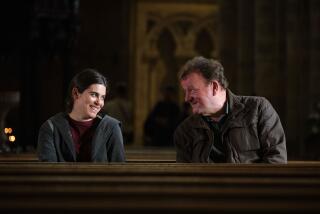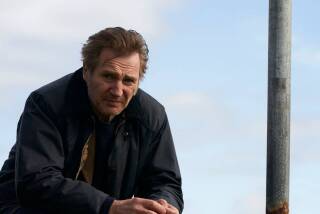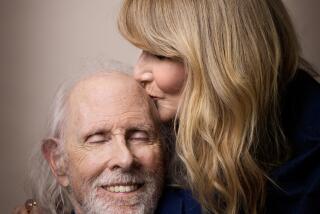‘Nebraska’s’ small-town beginnings
NORFOLK, Neb. — One night last year, Rachel Liester was waitressing at a restaurant near this rural town when she received an unusual request. A director was preparing to shoot a movie nearby, and her ticking off of the specials made her sufficiently camera-ready to merit an audition.
Soon after, Liester was reading for the director, who turned out to be Oscar winner Alexander Payne. And when Payne’s “Nebraska” — a coming-home father-son dramedy starring Will Forte and Bruce Dern — was released two weeks ago, there Liester was at a critical moment in the film, playing a waitress who keeps a cranky Dern honest.
“I’m not sure what I did well. I think he must have liked how I talked about the meatloaf,” said Liester, one of more than a dozen locals — including a laconic barfly, an ER doctor and an Orville Redenbacher look-alike with a penchant for folkisms — to land key roles in the film. All play versions of themselves.
VIDEO: ‘Nebraska’ Envelope Screening Series
“Diner” fixed Baltimore in our filmic consciousness; “Singles” made us think about Seattle in a new way. Now “Nebraska” aims to direct our attention toward the Cornhusker State. It’s a cinematically underrepresented place that native son Payne explores much more deeply in this film, using a bevy of real people and experiences, than he has in the previous movies — “Election” and “About Schmidt” — that he’s set in the state.
The black-and-white, award-contending movie, which has drawn strong reviews and solid art-house box office, could open American filmgoers’ eyes to a state they rarely consider — even as it stirs complicated feelings among the people who live here, who are balancing the rush that comes from Hollywood attention with the feeling that this big-screen portrait isn’t necessarily the one they might have chosen for themselves.
“It’s nice to see Nebraska up there on the screen. Some of it was funny,” said John Hoosier, a longtime Norfolk resident who works at the hospital in town, at a screening held here last week for locals.
“But I didn’t love everything about it. For example, the two cousins were really stereotypical,” he said alluding to a pair of local lunkheads the movie uses for comic effect. One of them, Tim Driscoll, is another non-actor local. Though he works as an electrician in Omaha, Driscoll, with adjustments to his voice and demeanor, can embody a kind of blunt foolishness; he was cast in the part.
PHOTOS: Celebrities by The Times
Payne dismissed the notion that people in the state might have an issue with how they’re portrayed.
“People want to say it’s condescending? Let them say that. This is my love letter to the state of Nebraska,” he said.
A family reunion
“Nebraska,” which sets much of its action at a family reunion in the fictional-but-archetypal town of Hawthorn, began not with Payne — who grew up in the comparative metropolis of Omaha and now lives there part time — but with screenwriter Bob Nelson.
Nelson was a Seattle-based comedy writer who had worked mainly on a local TV show when, a little more than a decade ago, he decided to pen a screenplay about rural Nebraska. His parents had come from small towns in the state, and he had strong childhood memories of traveling to visit his extended family, which included his father’s 16 brothers and sisters.
He wrote the script in part to capture the quirks of small-town life here, particularly as it had transitioned in recent decades from family-owned farms to agribusiness, putting people in economic straits.
But part of it was also an accident. The film’s plot turns on Dern’s character, a doddering retired mechanic named Woody, persuading his son (Forte) to drive from their home in Billings, Mont., to Lincoln, Neb., to claim a mail-order sweepstakes prize Woody believes he’s won.
PHOTOS: Behind the scenes of movies and TV
“Washington state doesn’t have headquarters for that kind of thing,” Nelson said. “If it did I probably would have set the movie there,” he said, laughing. (Woody and his son are then waylaid in Hawthorn, where a dysfunctional-family gathering takes place.)
Nelson drew many details of the story from his own life. His father, who died in the late 1970s, was a functioning alcoholic, similar to Dern’s character. A scene in which male relatives sit around watching football, breaking the silence only to utter brief words about cars or driving directions, comes from Nelson’s own terse family get-togethers.
That real-world color hasn’t gone unnoticed by the locals.
At a reception in Norfolk before the screening, Liester, a part-time waitress, gathered with several hundred locals, Payne and his principal cast to mark the film’s return to its roots. The mayor stood up and uttered words one doesn’t hear often at a Hollywood premiere. “You look awesome tonight. Northeastern Nebraska,” she said, to rousing cheers in the Christmas light-filled ballroom.
Several non-actors were then toasted, including a man who serves as an onlooker in a bar fight. He was in fact just a regular at one of the bars where “Nebraska” shot and occupied the same seat during the shoot as he does most nights. When the shoot was over, he swiveled around and went back to drinking.
Another local, Roger Stuckwisch, 72, was located for the shoot in an unlikely place. Stuckwisch, who with a long salt-and-pepper beard and a black earring suggests a Hasid by way of a subway busker, lives in a nearby town of just 1,000 people. He says he loves karaoke and performs it every weekend; he was cast in the movie after a casting director caught a spirited rendition of “Crimson and Clover” one Friday.
PHOTOS: Billion-dollar movie club
“I don’t need to be in the movie; I’m happy even if I was cut because it was a great experience,” he said before the screening. Then he paused. “But it would be great if I ended up in there.” (He did, in a karaoke scene.)
The collision of Hollywood and small-town America doesn’t happen often, which makes for interesting dynamics when it does. Dern, who traces some of his grandparents to towns nearby, spent the day workng the local angle.
“Three people. Tom Osborne. Willa Cather. And Henry Fonda. They’re from here. That’s what I’d say, and I’d tell them to shut the ... up,” he said, imagining what he’d reply to a person who questioned the virtue of Nebraska. (No such question had been posed.)
Payne, too, was keen to showcase his Cornhusker credentials. When Dern had told the crowd at an event in Omaha the night before that one reason it’s hard to get cast in a Payne movie is “you never see” the director in Los Angeles because he’s always in Omaha, Payne looked at the crowd knowingly and nodded, without saying anything, for a good five seconds, as if to say, “I’m one of you, not one of them.”
The movie does tap into the rivalries, invisible to outsiders but palpable here, between big cities and small towns, small towns and smaller towns.
With more than a million people, the greater Omaha region is, of course, the big city, followed by the film’s Lincoln, with several hundred thousand. Norfolk (pronounced, oddly, Nor-FORK) is two hours northwest of Omaha, past where the suburban strip malls give way to cornfields and anti-abortion signs. Plainview, where some of the movie’s Main Street scenes were shot, is further out.
FULL COVERAGE: Movie Sneaks 2013
“In a way this movie isn’t about Nebraska but about how life is lived in small towns everywhere as opposed to the big cities,” said Liester. “We just happen to have a lot of small towns.”
The sight of friends and family in speaking parts in the film prompted whispers and pointing throughout the screening, as wives poked husbands about acquaintances they would soon rib or congratulate. And jokes that played to decent amusement in screenings at the Cannes and New York film festivals here elicited deep laughter.
When Woody’s wife (June Squibb) stands in a Protestant cemetery and quips that a Catholic relative “wouldn’t be caught dead” amid the Lutherans, the crowd burst into sustained laughter.
After the screening, Bernie Auten, a Norfolk resident for more than 40 years, mused about the joke. “Those are the divisions we have around here. I guess now the world will get to see them.”
More to Read
Only good movies
Get the Indie Focus newsletter, Mark Olsen's weekly guide to the world of cinema.
You may occasionally receive promotional content from the Los Angeles Times.







